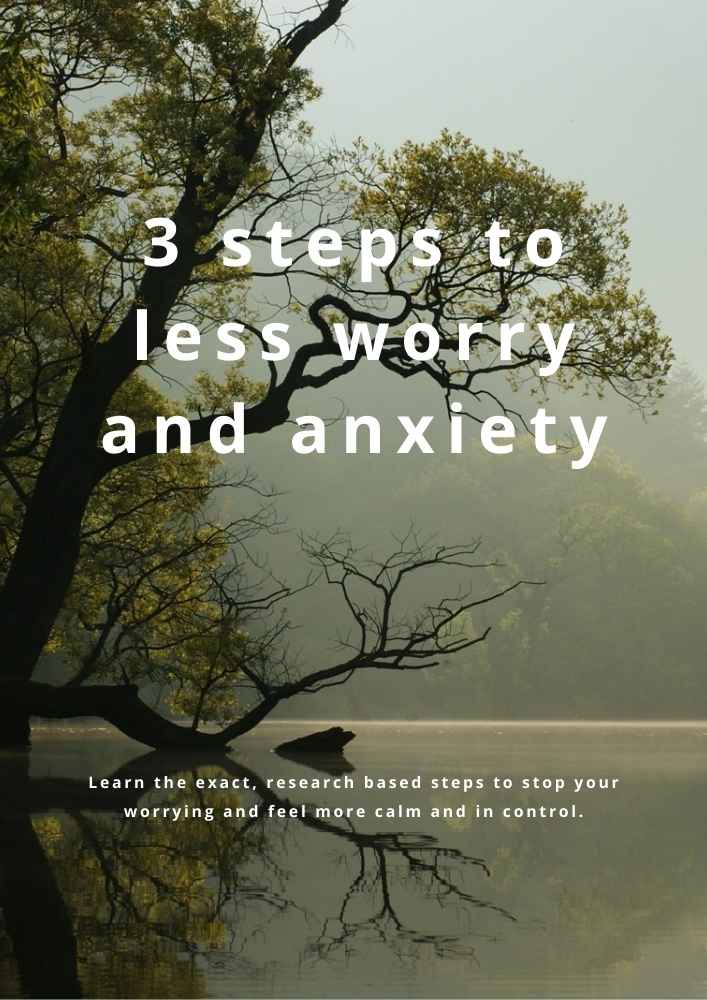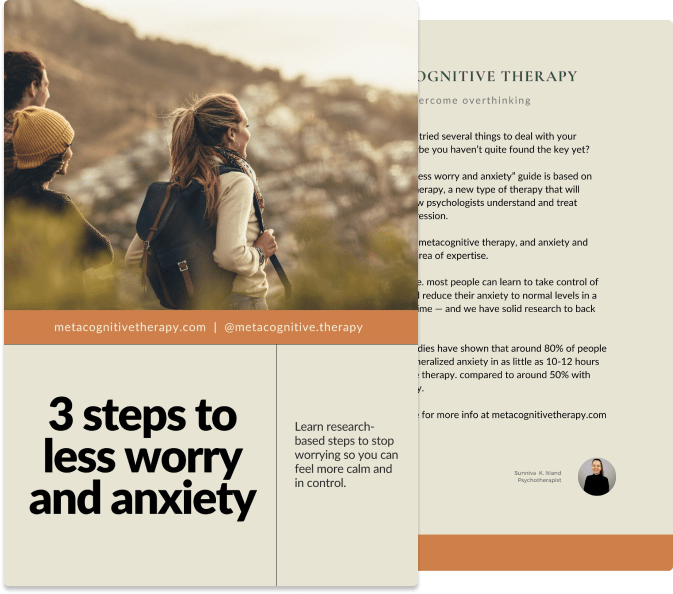Metacognitive beliefs: What they are and why are they important?

Download our best tips on reducing anxiety and worrying
Learn three powerful metacognitive therapy steps to stop the worry cycle, reduce anxiety, and feel calmer in everyday life.
%2520(1).jpeg)
%2520(1).jpeg)
What's the best way to deal with difficult thoughts and emotions? Should you focus more on your negative thoughts? Process them? Try to ignore them? Can you just leave them be? Is it helpful to worry? Can you even control your worry and rumination? Does rumination help you figure things out, or does it make you feel worse? And can you go crazy from worry?
Your answers to such questions are your metacognitive beliefs: your beliefs about your mental experiences and how to handle them.
Newer research shows that metacognitive beliefs might be one of the strongest underlying factor contributing to psychological disorders.
Metacognitive beliefs are your beliefs about your cognitions (thoughts, thinking, attention, memory an so on).
This concept is central in Metacognitive Therapy (MCT), a new evidence-based therapy that focuses on challenging unhelpful metacognitive beliefs that cause and maintain emotional and psychological distress.
Metacognitive beliefs direct how you respond to negative thoughts.
Everyone experiences difficult events, thoughts, feelings, and symptoms from time to time. The thoughts we get about these difficult experiences are called trigger thoughts.
Sometimes, trigger thoughts appear for no specific reason. Or they're triggered internally by symptoms and emotions. Other times, they're triggered externally, when something in your environment reminds you of an upsetting situation.
Some ways of responding to triggers are helpful. These are responses that self-limit the Cognitive Attentional Syndrome (CAS). But less helpful responses can activate and sustain the CAS, which is what maintains (and exacerbates) psychological distress.
.jpeg)
For example, if you believe that you should answer or solve negative thoughts, you'll spend a lot of time dwelling on your negative thoughts, keeping them at the forefront of your mind.
Similarly, holding a metacognitive belief that 'thinking the worst is helpful' will likely cause you to spend a lot of time thinking about horrible events that could happen, which inherently causes you to escalate feelings of sadness and anxiety.
The more time you spend doing this, the easier it becomes for you to think of frightening possibilities, and the more automatic this process will feel. But in reality, it's not automatic, it's a coping strategy: something that you do to cope with your triggers. And naturally, your coping strategy is affected by what you believe to be helpful, necessary, and under your control.
Our metacognitive beliefs (sometimes called metacognitions) dictate our strategy for how we deal with our negative thoughts, feelings, emotions and symptoms. Unhelpful metacognitive beliefs activate processes that intensify and prolong mental distress.

Download our best tips on reducing anxiety and worrying
Learn three powerful metacognitive therapy steps to stop the worry cycle, reduce anxiety, and feel calmer in everyday life.
Negative thoughts and feelings aren't the problem, your beliefs about them are
A common misconception is that people without mental problems don't have as strong or as many negative thoughts and feelings. This isn't true. Someone can have a whole range of upsetting and recurring thoughts, feelings and symptoms, and still not struggle with their mental health.
By comparing the thinking habits and strategies of people with and without common mental disorders, researchers discovered that the difference between people with and without mental disorders is not in the content, frequency, or strength of inner experiences. In reality, the difference lies in their beliefs about these experiences, and how to best respond to them.
Studies have shown that challenging unhelpful metacognitive beliefs leads to rapid improvement for a range of common psychological disorders. This breakthrough discovery is calling into question the prevailing understanding of the root causes of mental health issues.
Clinical studies demonstrated that for a range of mental disorders, metacognitive beliefs are the strongest predictive factor. Metacognitive beliefs play an essential part in how we respond to negative inner experiences, and can promote or self-limit the process of overthinking.
The goal of MCT is to challenge the metacognitive beliefs that keeps you stuck in thinking patterns that maintain mental distress. MCT does this in a very hands on, practical way, through dialogue, exercises, and homework that shows you exactly how you can leave your negative thoughts alone and spend less time caught up in worrying and ruminating.
Simplified, there are two main groups of metacognitive beliefs: positive and negative. Despite their contrasting names, both positive and negative metacognitions can lead you into cycles of worrying and ruminating.
Here's how it works:
Negative metacognitive beliefs
Negative metacognitive beliefs refer to beliefs about your own thought processes being potentially dangerous and out of your control. There are three main types of negative metacognitive beliefs.
Uncontrollability beliefs are beliefs about not being able to control your own thinking or mental processes. For example, 'Once I've started worrying I can't stop it' or 'If I don’t control my worry, it will control me.' This can lead to a feeling of helplessness and hopelessness.
Danger beliefs involve the idea that certain thoughts or mental processes are inherently dangerous or harmful. Examples might be 'worrying too much can make me go crazy,' or 'my depressive thoughts control me.' These beliefs can lead to excessive fear or avoidance of certain thoughts and experiences, potentially backfiring and exacerbating anxiety and emotional distress. This can lead to worry about worry.
Importance beliefs are beliefs that certain thoughts are important or hold power. This can sound like: 'These thoughts must be taken seriously,' or 'If I don't analyze my thoughts, I might miss something important.'
Positive metacognitive beliefs
In contrast, positive metacognitive beliefs involve the perceived helpfulness of worrying, ruminating, and threat monitoring. People with these beliefs think that dealing with thoughts and feelings through these methods is beneficial: 'Worrying helps me cope,' 'Rumination helps me understand myself better,' 'Constantly monitoring my health will help me spot a disease early on,' or 'Analyzing my problems will help me find answers.'
On the surface, these beliefs seem reasonable, as they imply that worry and rumination can lead to problem-solving and understanding. But they can also intensify and prolong negative feelings.
Positive metacognitive beliefs are also common in people who don't struggle with anxiety or depression, and don't necessarily lead to mental health issues (although they probably do lead to more negative feelings). It is when positive metacognitions are combined with beliefs about the uncontrollability and danger of worry and rumination that problems start to arise.
This is because if you only believe that negative thinking is helpful, you can simply stop when you've had enough. If, on the other hand, you believe negative thinking to be both helpful and uncontrollable, you will consistently be engaging in a cycle of negative thinking that you don't know how to stop.
If you also believe that these thinking processes can harm you (e.g. danger belief), this further increases your anxiety as it raises the stakes. You now believe that a process which you have no control over, and that you can't avoid, can ultimately damage your mental or physical health.
Let's look at one of the previous examples: 'Worrying helps me cope.' If you believe this, you will more often respond to negative thoughts with prolonged worrying. But if you do not believe worrying to be uncontrollable, then you will probably stop once you feel you've thought things through well enough, or once you reach the point that worrying no longer feels helpful.
If, on the other hand, you believe that worrying is uncontrollable, you won't feel able to stop, and the worrying can spiral into anxiety.
Why uncontrollability is the most influential belief
Out of the different types of metacognitive beliefs, there is one that is most important to examine: Uncontrollability.
Have you ever been frustrated with someone telling you to 'Stop worrying so much,' or 'Why don't you just stop thinking about it?' Most people who struggle with mental problems would argue that this is insensitive, as it suggests that there's some sort of magic off-button you could press.
But according to the metacognitive model, you actually can stop overthinking — you might just not know how.
This isn't because your mind functions inherently differently from people without psychological disorder. You have the same type of mind, you just use different strategies and have different beliefs.
When you believe that you can't stop your overthinking, this often leads to coping strategies that don't work or that backfire (such as distraction, thought suppression, and trying to think yourself out of overthinking). This further reinforces the belief that the thinking is outside of your control.
Many people also have unrealistic goals, such as 'I need to get rid of the thought completely in order to stop worrying'. This leads them to try to control things that can't be controlled, like what thoughts they're conscious of (what thoughts enter the mind), instead of the things that they can control (i.e. which thoughts they choose to engage with).
Most people without psychological problems don't believe that worrying and rumination is out of their control.
This is because they have goals and strategies for interrupting overthinking that generally work, which allows them to easily snap out of negative and anxiety-inducing inner dialogues, and shift their attention to other topics or to what's going on around them. This again allows negative inner experiences to pass instead of being exacerbated and maintained.
Knowing that you can decide how, when, and how long you want to engage with a negative thought allows you to have a much more relaxed relationship with your thoughts.
By challenging your metacognitive beliefs and developing more adaptive responses to your negative thoughts and emotions, you can rediscover that overthinking is within your control.
If you find yourself excessively worrying, check out this article on why it happens and how to stop it.
Selection of consulted references
[1] Hjemdal, O., Hagen, R., Nordahl, H. M., & Wells, A. (2013). Metacognitive Therapy for Generalized Anxiety Disorder: Nature, Evidence and an Individual Case Illustration. Cognitive and Behavioral Practice, 20(3), 301-313. Advance online publication. https://doi.org/10.1016/j.cbpra.2013.01.002
[2] Fisher, P., & Wells, A. (2009). Metacognitive therapy: Distinctive features. Routledge. https://doi.org/10.4324/9780203881477



